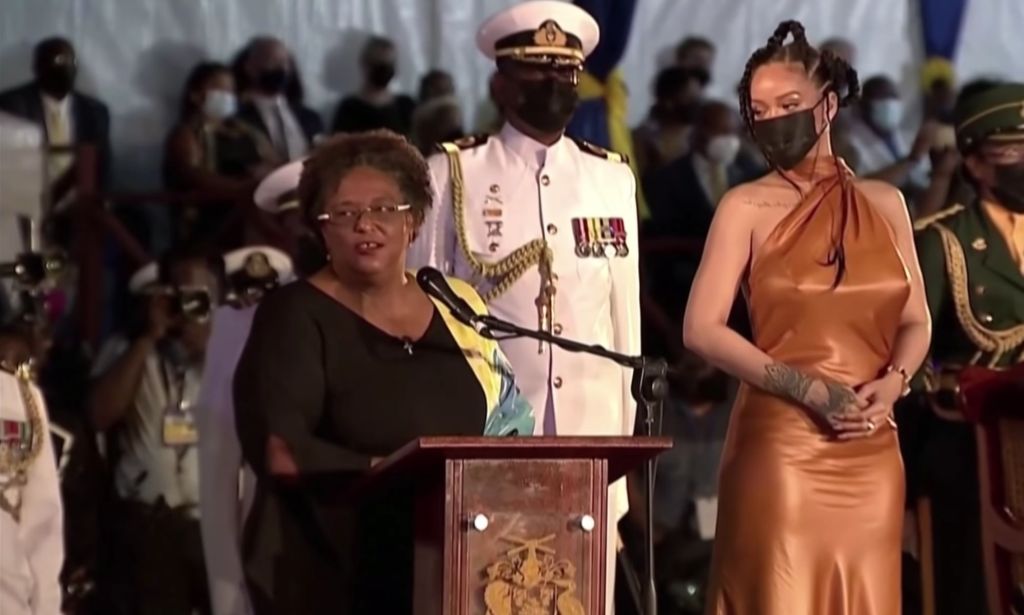Barbados activists pushing for LGBTQ+ rights after shedding ‘cloak of imperialism’

King Charles witnessed Barbados becoming a republic in 2021. (Sky News)
Almost a year before he acceded to the throne, King Charles travelled to Barbados to witness it divorce itself from the monarchy.
Barbados removed Queen Elizabeth II as its head of state and became a republic in November 2021. The move heralded a new era for Barbados, ending centuries of British influence over the island, which was a hub for the trans-Atlantic slave trade for more than 200 years.
It was also a defining moment where Barbados could begin to examine its stance on LGBTQ+ rights.
A year after independence, the country’s top court struck down colonial-era laws criminalising homosexuality, though it continues to lack legal gender recognition for trans people and protections for trans people from discrimination in some circumstances.
As the country carves its own path forward, LGBTQ+ activists say it’s time for ‘social attitudes to reflect the times’.
Raven Gill – founder and executive director of the country’s only trans-led and focused civil society organisation, Butterfly Barbados – was among the litigants who brought the legal case to overturn the “buggery” and “indeceny” laws.
She tells PinkNews her face wasn’t the “most prominent one on the docket”, but because she’s a trans woman, she was used to “sensationalise the story” in the media.
“I received death threats from people in America,” she recalls. “I received random phone calls in the middle of the night, and I don’t know how people got my number – [in] Barbados, privacy is a joke, confidentiality is a joke.”
Gill says it’s “not ideal for trans people to live openly and visibly” in Barbados. She describes how trans people risk “discrimination, harassment and bullying” which makes it difficult to navigate everyday life.
“Opening a bank account or even travelling is a hazard sometimes,” she says. “I’ve been held in airports because my passport doesn’t reflect my gender identity.”
“It is difficult navigating as a trans person openly in Barbados. We’ve gone to the government to ask for these things to be rectified, especially now that Barbados has become a republic breaking ties from the UK.
“There is a new constitutional reform process, and the committee has been made aware of our struggles by submissions and in-person… We voice our issues at the town halls [but] we’ve also met a huge pushback from the evangelicals.”
Gill believes the “vitriol” experienced by trans people in the UK “is trickling down to Barbados”.
“You see a lot of comments online saying that we are demons, we don’t need to get any rights, we don’t need protections within the law.”

While many in Barbados are hopeful of further legislative change – prime minister Mia Mottley is considered an LGBTQ+ ally – Gill says this won’t ultimately change the “minds of the masses”.
“There need to be a better education campaign to sensitise the wider public, those who are anti-LGBT or those who don’t have much interaction within the community but are willing to learn, because awful ignorance will always drown out our voices and what we are actually advocating for truthfully,” she says.
Gill notes that some labelled the end of the “buggery” law as a “descent into paedophilia”.
She continues: “I do think that though we are on track to remove the colonial laws – and again, the colonial laws lacked the social impact, the social attitudes need to reflect the times going forward as we work towards becoming a constitutionally reformed republic free from the monarch.”
Zi Donnya Piggott has been an LGBTQ+ advocate for a long time in Barbados. He says the situation “might look bleak” but believes the island has done “very, very well” on growing an environment where queer people can thrive.
“The law, the major anti-gay buggery law being struck down, having some kind of protections in the workplace and the government placing an LGBT representative at the table at the social justice committee are all little small steps that I think are worth celebrating,” she says.
Piggott says constitutional reform is a “very tough job”, and they’ve even submitted a paper that will hopefully influence how the government creates a new, inclusive constitution.
They feel like Barbados was under a “cloak of colonialism and imperialism”, and now, it’s time for the republic to analyse how “we become who we are”.
Socially, Piggott says, she’s seen more LGBTQ+ people being able to live authentically.
“I always recognise that, across the world wherever you are, the legal situation might not really change your social situation,” she says.
“But I do recognise that a lot of LGBT people are still coming out, being their authentic selves. We’ve had people in the music industry in Barbados, people in the arts just being themselves.
“I think Barbados has come a long way, maybe because I started in the early 2000s. Just to see queer parties on the main street, there’s a queer line that happens sometimes on Fridays like at a bar, in the street.
“It’s not like before when we used to party in some obscure place in the middle of Barbados. Now these parties are becoming more mainstream.”

